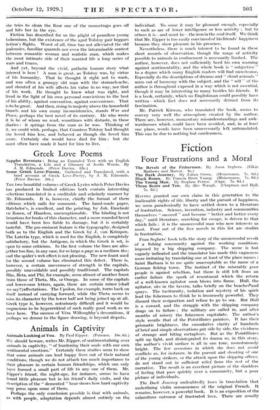Animals in Captivity
Animals Looking at You. By Paul Eipper. (Putnam. 10s. 6d. ) WE should beware, writes Mr. Eipper, of sentimentalizing over animals in captivity, " of burdening their souls with our own sentimental emotions." Certainly these studies seem to show that some animals can lead happy lives out of their natural conditions, though we do not attach too much importance to their pleasure in certain human friendships, which can only have formed a small part of life to any one of them. Mr. Ripper's friend, the night-ape, for instance, seems to have found little pleasure but in his friend's daily visits, and the description of the " demented " bear shows how hard captivity may press upon some of them.
Perhaps the only conclusion possible is that with animals, as with people, adaptation depends almost entirely on the -individual.- Ta. sonic it may be pleasant enough, especially to such as are of lower intelligence or less activity ; but to others it is—and must be—the iron in the soul itself. We think that Mr. Eipper is too easily convinced of his friends' happiness because they show pleasure in his presence.
Nevertheless, there is much interest to be found in these . short records of observation, though the range of activity possible to animals in confinement is necessarily limited. The author, however, does not sufficiently heed his own warning against sentimentality, and the whole book is " subjective " to a degree which many English readers will find unwelcome. Especially do the descriptions of dreams and " cloud animals seem out of harmony with the subject, and the " self " of the author is throughout exposed in a way which is not essential, though it may be interesting to many besides his friends. ft is a book, certainly, which no Englishman could possibly have written—which fact does not necessarily detract from its fascination.
Mr. Patrick Kirwan, who translated the book, seems to convey very well the atmosphere created by the author. There are, however, momentary misunderstandings and awk- wardnesses which could have been avoided, and, in at least one place, words have been unnecessarily left untranslated. This can be due to nothing but carelessness.








































 Previous page
Previous page